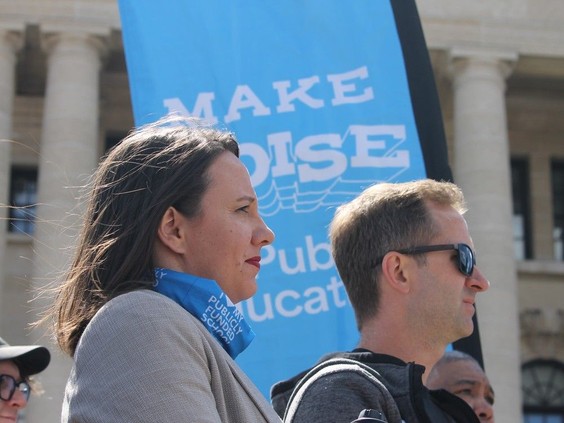
Larissa Kurz
Regina Leader-Post
The provincial teachers’ union says it may consider job action if the government continues to hold out on critical issues at the bargaining table with Saskatchewan teachers.
Contract negotiations between the Saskatchewan Teachers’ Federation and the province began in August, seeking to define a new collective agreement for teachers.
Union president Samantha Becotte said the most recent round of talks, held last week, ended with the province’s government-trustee bargaining committee refusing to budge on issues membership says are pivotal, like classroom complexity.
The union declared an impasse at the table on Friday and now intends to file for conciliation by the end of the week, said Becotte.
A vote on sanctions will also be presented to members on Oct. 24-25.
“We do not want to be in this position, but government’s disrespect towards teachers, their bad faith bargaining tactics and their intransigence — not just through the bargaining process, but in their continued refusal to make students and public education a priority — has forced us into our current path and has left us with no other options to take,” Becotte said Monday.
In entering conciliation, per the Saskatchewan Employment Act, a third-party negotiator will be appointed to mediate between parties, with the goal of aiding a negotiated settlement.
Items in contention are compensation and benefits, as well as teachers’ working conditions, classroom complexity and lacking student supports, according to Becotte.
She said government is “refusing to negotiate on these crucial issues,” having rejected nine of 10 teacher proposals presented since negotiations began this summer.
“We are all being impacted by the deterioration that we’re seeing in public education, and it is heartbreaking to see,” said Becotte.
“The challenges and the complexities of classrooms have got to such an extreme that, in many cases, we’re talking about students just getting by. They’re surviving their pre-K to 12 education, when they should be thriving.”
Speaking during question period in the legislature Monday, Minister of Education Jeremy Cockrill said government “is at the table, ready to make a deal happen.”
The proposed offer, according to Cockrill, is a seven per cent wage increase over three years, which he called “a fair deal for teachers.”
He encouraged teachers to “encourage their bargaining teams, to direct their union leadership to come back to the table.”
The STF bargaining committee is willing to continue talks in good faith, said Becotte, but only if government is “prepared to actually negotiate and find solutions that begin to meet students needs.”
If not, she warned “there would be no point to continue to prolong this process” and the union would consider possible job action.
If next week’s vote returns in favour, it would clear the union to launch action like teachers refusing to engage in extracurricular activities, similar to what occurred in March 2020 after bargaining hit roadblocks on similar issues of classroom size and composition.
It could also allow for rotating strikes or a full walkout.
Becotte clarified the vote doesn’t mean immediate job action will ensue, and the union has “no specific job actions we’re planning,” but it allows the bargaining committee to pursue such, if deemed necessary.
“Teachers do not want the school year interrupted. We want to be in our classrooms, but we also want students to have the supports and services that they need, and we want that to happen as soon as possible,” she said.
“What happens next, that’s up to the government.”
Opposition critic Matt Love said the province is failing to deliver on classroom needs.
“There are fewer teachers and fewer supports than last year, even though there were more than 3,800 students added in Saskatchewan, More students, fewer supports,” said Love.
Cockrill recited delivery of $40 million this June for classroom complexity and enrolment, which he said added 119 teachers, as “real investment by this government.”
“I will stand behind this government’s record on education investment, any day of the week,” he said.
The update follows another weekend rally in Moose Jaw, where STF says around 1,000 people turned up to speak out about the state of education in Saskatchewan.
Attendees lined High Street, outside Minister of Addictions and Mental Health Tim McLeod’s office, calling on him to exercise his power as a Treasury Board member to prioritize education spending.
Becotte said the turnout is indicative of how parents, students and teachers are all feeling.
“Cuts and chronic underfunding have created a crisis in public education in all areas of the province,” she said.
“Government’s decision not to fund your child’s education properly is a political choice. It’s not an economic one. They have the money,” she continued, referencing $1 billion surplus revenues touted in March.
More rallies are planned over the next three weeks to continue pressure, said Becotte.
Next will be a gathering in Humboldt, at Finance Minister and Treasury Board president Donna Harpauer’s office on Oct. 21, followed by a rally in Saskatoon at Minister of Corrections, Policing and Public Safety and Treasury Board member Paul Merriman’s office on Oct. 28 and in North Battleford at Education Minister Jeremy Cockrill’s office on Nov. 4.

